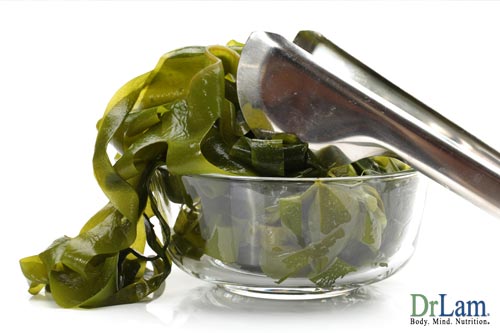
 The statistics are staggering. According to the American Thyroid Association, over 20 million Americans suffer from some type of thyroid disease, and up to 60% of them are unaware of it. Most conventional methods for addressing thyroid issues involve lifelong medications. Many people are put on thyroid medication as soon as they complain about fatigue, even if their tests come back normal or marginally showing some kind of low thyroid issue. But something to keep in mind is that thyroid medications can be a double-edged sword, and there are actually many different kinds of natural thyroid remedies that could be just as helpful.
The statistics are staggering. According to the American Thyroid Association, over 20 million Americans suffer from some type of thyroid disease, and up to 60% of them are unaware of it. Most conventional methods for addressing thyroid issues involve lifelong medications. Many people are put on thyroid medication as soon as they complain about fatigue, even if their tests come back normal or marginally showing some kind of low thyroid issue. But something to keep in mind is that thyroid medications can be a double-edged sword, and there are actually many different kinds of natural thyroid remedies that could be just as helpful.
The thyroid is a small gland located at the lower part of your neck. It is responsible for producing hormones that regulate metabolism and energy, making it a crucial support for the body’s systems and organs to do their jobs.
Having some kind of disruption in the thyroid gland will not only affect your energy levels and metabolism, but when those are affected, the rest of your body’s functions start to suffer as well.
Thyroid issues include:
Depending on the type of thyroid problem you have, a specific remedy will be indicated. For example, thyroid cancer, which is actually one of the easiest cancers to address, is very receptive to surgery.
Most types of thyroid issues don’t have a single solution, but need a plan to manage the thyroid imbalance, which usually includes some kind of medication or other natural thyroid remedies. And that is perfectly fine if you are given the right medication for your needs. However, many people are put on thyroid medications simply because they complain of fatigue and doctors don’t really know what to do with them.
If that is your case, there are a few natural thyroid remedies you might want to consider. They can support your thyroid without many of the side effects of medication.
Before embarking on a journey for natural thyroid remedies, you should first consider your adrenals as a possible cause for your issues.
One of the most frequently overlooked areas when the thyroid is out of order is adrenal function. However, the thyroid and adrenals are hormonally interconnected, and strong adrenals will support the thyroid gland.
The adrenal glands are two small organs that can be found on top of your kidneys, and they are responsible for some very important functions in the body. First of all, they produce the hormones, such as adrenaline, that kick in your “fight or flight” mode. They also produce cortisol, the body’s main stress-fighting hormone.
 Cortisol helps regulate blood pressure, maintain blood vessel and heart function, suppress immune system reaction, and neutralize inflammation caused by this reaction. In short, it is a miracle worker.
Cortisol helps regulate blood pressure, maintain blood vessel and heart function, suppress immune system reaction, and neutralize inflammation caused by this reaction. In short, it is a miracle worker.
But when the adrenal glands are put under extreme pressure from chronic stress, whether mental, emotional or physical, is that they begin to dysregulate their production of cortisol.
This can cause Adrenal Fatigue Syndrome (AFS).
In the beginning stages of AFS, the adrenal glands produce more and more cortisol to deal with stress. But in more advanced stages of AFS, they weaken and produce less cortisol. This adrenal exhaustion can lead to serious problems, as the body’s defenses against stress are no longer functioning.
Symptoms of AFS include fatigue, sleep disturbance, brain fog, inability to handle stress, easily gaining weight and difficulty losing it, low libido, fertility problems, PMS, heart palpitations, mild depression, frequent colds and flus, allergies, anxiety, memory loss and more. Different stages of AFS present different symptoms, but all of them have the undercurrent of low energy and constant tiredness.
As you can see, hypothyroidism has some similarities to AFS, which shows how the adrenals and the thyroid are interlinked.
It goes even further. The adrenal glands are part of the body’s overall stress response – called the NeuroEndoMetabolic (NEM) Stress Response. The NEM is composed of six circuits: the neuro-affective, the metabolic, the hormonal, the cardionomic, the inflammatory and the detoxification circuit.
As the first line of defense against stress, when the adrenals are dysregulated they leave the rest of the body’s NEM organs and systems to compensate. And of course, if the stress does not lessen, they, too, eventually become affected, causing a host of other health problems.
This is important if you have thyroid issues, because taking medications right off the bat without first checking if your adrenals are a causal factor overlooks the possibility of a weakening in the adrenals. This may eventually cause more and more problems and an inability to feel better no matter what kind of medication or other natural thyroid remedies you follow.
If your thyroid is in a weak state, make sure you support your adrenal glands as well. You can do this by implementing a dietary program, practicing adrenal exercises appropriate for your current state, using select vitamins and supplements, and getting better sleep. You’ll be surprised how well this can give your thyroid the gentle, nurturing support it needs. This is where to begin.
As with any natural thyroid remedies or medical health plans in general, you should talk to your doctor first. Trying to figure out how to balance adrenal and thyroid hormones alone is not a good idea. Malfunctions of one gland affects the other, and a vicious cycle may ensue.
The recommendations here are to be used with care.
In addition to supporting your adrenal glands, there are many other things you can do to improve thyroid function.
Whether for your adrenals or your thyroid, nutrition is the first and most vital step to take towards feeling better. The kind of diet that supports one will support the other.
 Here are some suggestions:
Here are some suggestions:
If you are unsure how to balance your diet so that you can support both your adrenals and your thyroid, one option is getting nutritional coaching from an expert on both.
It may seem overwhelming at first, but if you take diet changes one step at a time, soon you will have a new lifestyle that does not feel like a restrictive diet, but a supportive nutritional plan.
Iodine is the building block of the thyroid. It is essential for the production of thyroid hormones, specifically triiodothyronine and thyroxine.
As the body does not make its own iodine, it needs to be ingested from external sources. Once iodine enters the bloodstream, the pituitary gland is responsible for the process to get it to the thyroid, which then uses the iodine to produce these hormones.
If you have iodine deficiency, you are at risk for developing goiters or hypothyroidism.
Thankfully, if the thyroid problem you have is due to a lack of iodine, you just need to make sure your diet contains enough of it. You can also opt for iodine supplementation, which makes your intake more accurate and measurable.
On the other hand, if your hypothyroidism is caused by something else, such as Hashimoto’s, adding iodine is not very helpful. The root cause of the problem is an immune system dysfunction.
This is why it is important to really get to the bottom of the issue, so you know what kind of natural remedies and support you can give your thyroid.
Interestingly enough, iodine also plays a role in supporting the adrenal glands, and adrenal fatigue recovery.
The NEM stress response plays a role in the body’s hormone levels, nutrient delivery, and detoxification systems. Since iodine helps with the creation of hormones crucial to metabolism and energy levels, it is essential for the overall balance of the NEM stress response.
Kelp is a excellent way to get iodine. Kelp also contains many other minerals that are good for your health. Some of its many health benefits include supporting the bones, cognition, cardiovascular health, and relaxation (which is also important for AFS recovery).
You can also find iodine in seafood, eggs, carrots, cabbage, spinach, garlic, sesame seeds and berries. Still, because there can be soil deficiencies, kelp is one of the better food of choices for iodine.
The bottom line is that nutrition is the key player in any natural remedy plan for your thyroid.
Glandulars are natural compounds derived from the glands of animals, then processed to deliver these cell extracts to the same gland in a human being. Though theoretically any animal can be used for glandulars, the most common types are from cows, pigs, and sheep.
There are natural thyroid remedies made of thyroid glands, as well as extracts from the adrenals, ovaries, testes, thymus, and spleen. Thyroid glandulars provide cells that contain thyroid hormones, which help with hypothyroidism. Adrenal glandulars can provide anti-inflammatory properties.
 However, while it is good support the adrenals if your thyroid is weak, it is important to avoid using stimulants to the adrenals, which could overtax them further. This includes glandulars and herbs that work by getting the adrenals to produce more cortisol for the sake of energy.
However, while it is good support the adrenals if your thyroid is weak, it is important to avoid using stimulants to the adrenals, which could overtax them further. This includes glandulars and herbs that work by getting the adrenals to produce more cortisol for the sake of energy.
Instead, support the adrenals in a nurturing, gentle way so that they kick in to produce their own hormones that will in turn support thyroid function.
Some of glandulars are purportedly adaptogenic, meaning they’re supposed to support the body and help the body’s adrenal glands perform at a higher level when necessary. They are also supposed to be self-regulating. However, especially in cases of advanced adrenal fatigue, this is not necessarily true.
Also, note the distinction between desiccated thyroid glandulars recommended by physicians and over-the-counter thyroid glandulars. Make sure you don’t take a thyroid medication suggested by your doctor with an over-the-counter glandular unless you’ve specifically discussed it with your doctor. This could potentially cause hyperthyroidism.
Whenever you can, choose more gentle therapies that support hormonal balance from the inside out rather than from the outside in. This advice applies to natural thyroid remedies as well as traditional medication.
It is not uncommon for patients on thyroid medications to complain of a recurrence or continuation of their symptoms. That is because the root cause has not been addressed, and the medication is only working on the surface level.
Severe and chronic stress affects the delicate hormonal balance in the body, whether it is a dysregulation in the thyroid, adrenal glands or the rest of the NEM stress response. So, make sure you find a way to manage your stress and get good rest, as a foundation of thyroid support.
© Copyright 2017 Michael Lam, M.D. All Rights Reserved.

